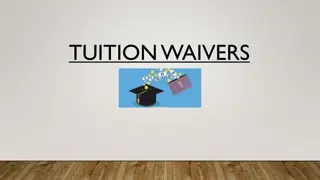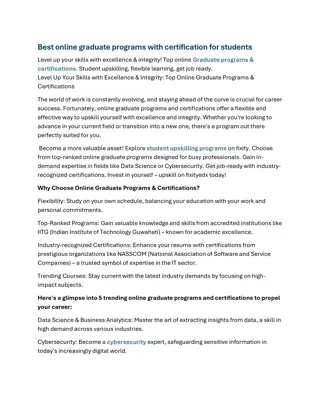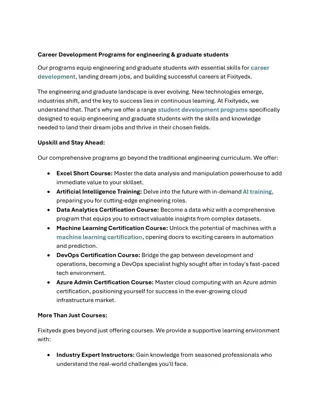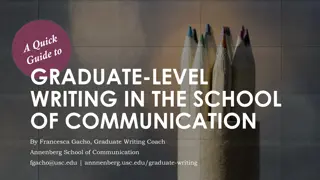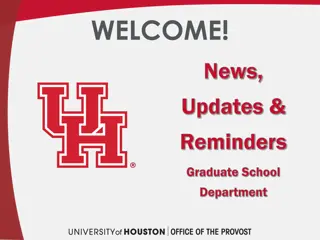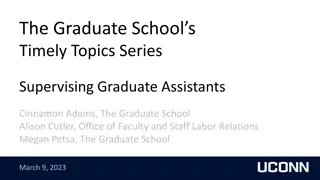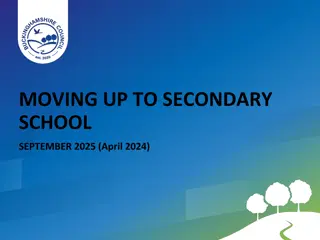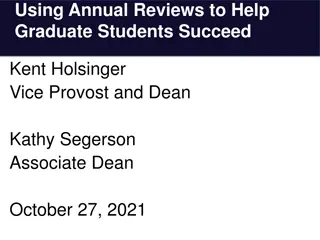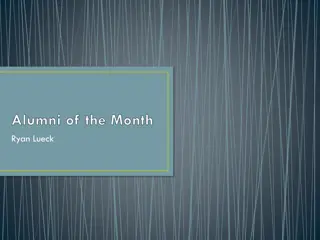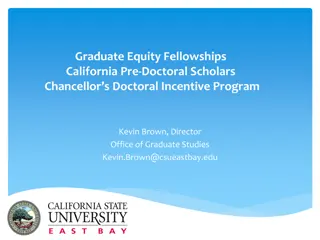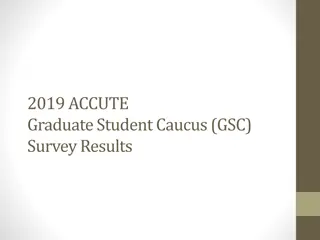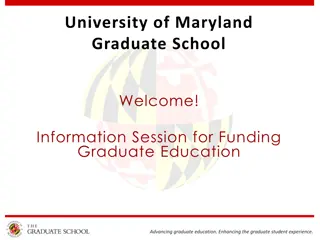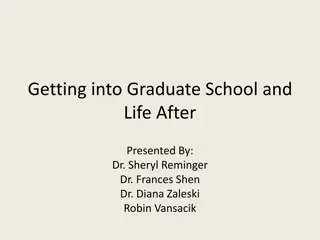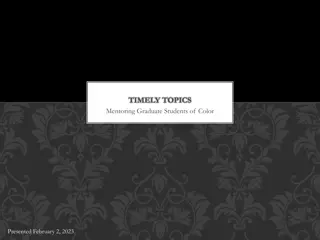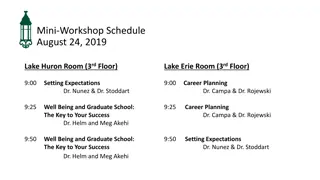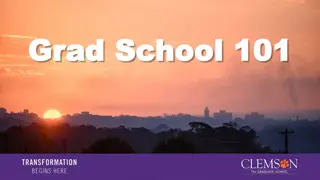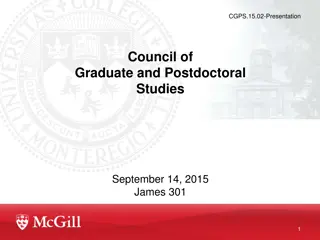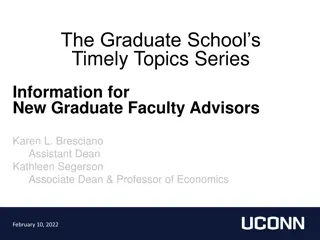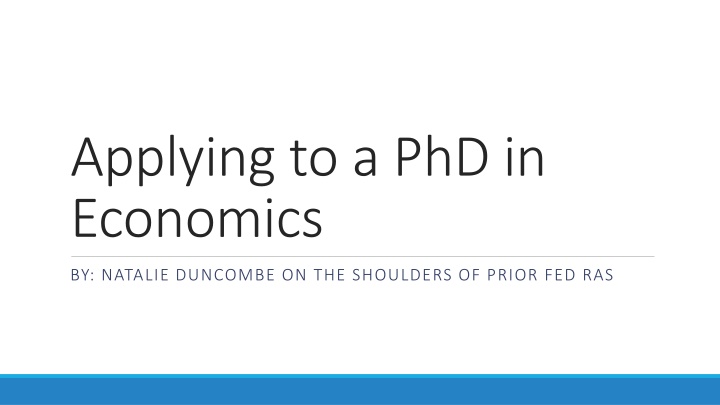
Tips for Applying to a PhD in Economics: Improve Your Chances
Learn valuable insights on how to enhance your prospects for a PhD in Economics. Discover the importance of research potential, coursework, GPA, GRE scores, letters of recommendation, and more. Find out how to focus on areas of improvement and the timeline for key application milestones.
Download Presentation

Please find below an Image/Link to download the presentation.
The content on the website is provided AS IS for your information and personal use only. It may not be sold, licensed, or shared on other websites without obtaining consent from the author. If you encounter any issues during the download, it is possible that the publisher has removed the file from their server.
You are allowed to download the files provided on this website for personal or commercial use, subject to the condition that they are used lawfully. All files are the property of their respective owners.
The content on the website is provided AS IS for your information and personal use only. It may not be sold, licensed, or shared on other websites without obtaining consent from the author.
E N D
Presentation Transcript
Applying to a PhD in Economics BY: NATALIE DUNCOMBE ON THE SHOULDERS OF PRIOR FED RAS
Model of an applicant Admissions = Research Potential + Coursework Survival Chances + Other Admissions = Ranking of school accepted to, funding package Other = Research Potential = Research Assistantship Undergraduate research Publications Coursework Survival Chances = GPA (particularly for math and econ classes) Math and economics coursework GRE Undergraduate institution reputation Undergraduate alumni Do people know your recommender? Networks matter especially at top programs NSF Other activities
What Matters College GPA GRE First cuts Letters of recommendation Research experience / output Math background & grades Gauge of research pot l NSF Personal statement Other experiences eg. teaching, extenuating life circumstances On the fence
Focus on What You Can Improve GRE Focus on the Quantitative Section Think up or out a high score won t get you in, but a low score will keep you out Many schools want a minimum of 90 percentile (around 165), many applicants will have a 170 Don t embarrass yourself on the rest Math background & advanced economics courses Graduate school involves a lot of math. Need to show you can survive the first year, but don t need to be excessive. More classes will make first year easier for you too Take at least through Real Analysis. Advanced statistics and probability can also be helpful Graduate Economics courses can also be helpful.
Focus on What You Can Improve Research Seen as indicative of future work this is what an economics PhD is all about! Think of polishing your honors thesis and sending it off to an undergraduate journal Work on a long-term research project as a Research Assistant Research Assistance is a signal of interest in research, even if you don t publish anything Many schools ask for writing samples (~20 pages)
Timeline End of summer Take GRE Have research output Late October NSF due Send transcripts and GREs End of February Start hearing back from schools March-April Admit Days December-early Jan DEADLINES!! August Enroll in any math classes April 15 Your decision! February June August October December April
Apply to Schools You Want to Attend Remember: Safety, Target, Reach 15-20 is about the average Fewer you will be saner More you are more likely to get in, it s an odds game
Considerations Ranking US News ranking good for ideas, can sort by field Talk to professors, economists, RAs, current PhD students about schools that could be a good fit for you. Reputation Supportive or weed students out? Fields Faculty Placements Assume you will be the modal student Location If you re not applying to schools because of the location, how will you feel on the job market?
Economics vs. Friends of Economics Consider applying to economics programs in business schools, finance, or public policy schools. While economics Ph.D. graduates can and do find employment in economics departments, business schools, political science departments, and health policy departments in medical schools, Ph.D. graduates of these FOE programs are typically employable only in FOE departments even if they are working on exactly the same topic that an economics graduate is. Unfair but true . Thus, economics graduates generally have a wider range of employment opportunities than FOE graduates If you are unsure of your area of interest within economics or if you are keen to have the broader training afforded by economics, an econ program would be a better option for you. If you are very sure of your research interests and don't want to waste your time taking courses not related to them, a FOE program is a better choice. - Stuart J. Hillmon, Getting a PhD in Economic
Application Components SOME APPLICATIONS ALL APPLICATIONS Standard info Textbook list Personal statement Financial info Resume (send even if optional) Personal history or Diversity essays Transcripts (hard copies or scanned) Writing sample (can usually use your NSF proposal, but some will ask for closer to 20 pages)
Stay Organized School Deadline User- name Pass- word URL GRE code Transcripts Mailing Address Personal Statement Instr Additional Need 2 official transcripts Upload- less than 2 MB Mail resume and writing sample
NSF Graduate Research Fellowship Program (GRFP) National grant from the National Science Foundation that provides a three-year annual stipend of $34,000 along with a $12,000 cost of education allowance for tuition and fees. Good signal to graduate schools, also a good way to convince yourself you re excited about research October deadline gets you ahead of the game with your applications Application Parts: Three Reference Letters Personal, Relevant Background and Future Goals Statement Graduate Research Plan Statement
Pick Recommenders with Care They should be able to speak to your research and analytical abilities Professors (econ or math) Thesis advisor* Economists at the Fed Keep in touch with professors who you will ask to write recommendation letters General advice to have two undergraduate professors and one Fed Economist, but adjust to your situation
Personal Statements Focus on Research Treat this as an extended cover letter Qualifications Research experience & interests Career goals You will likely need multiple Lengths (500, 1000) Types of programs (finance, economics, business school) Have people read it over! Get feedback! More important for the NSF where they are picking the person, not just your economics prowess
Budget for the Costs For most applications: Application fees GRE score reports Transcripts (official) $70-$125 $27 per school $5-10 Other expenses: GRE Test $190 + test prep
Then what? Choosing a School Reputation matters As many in the field will tell you, a program s ranking and how well they place students on the job market will probably be one of your top criteria for choosing Rankings held equal, pick a few things that matter most to you Potential ones: faculty members, specialties, placement, size, funding & stipend, location, good core econ training, student satisfaction, RA/TA requirements, opportunities to present papers Investigate these things Visit campus Talk to people - current students, alums, faculty, FRB economists Don't be shy. Ask tough questions (politely). Schools have different cultures Some are more mentoring, work more with students, co-author frequently Others expect more independence, less mentoring, co-author rarely Think hard about which environment suits you Trust your gut
School Rankings by Gender Inclusion Top 15 Schools ranked by inclusion of women from 2010-2015 % Female Students Rank School 1 Columbia University 38 2 University of California-San Diego 36 3 Massachusetts Institute of Technology 32 4 University of Wisconsin- Madison 30 5 University of Michigan Ann Arbor 29 Yale University University of California-Berkeley 29 29 University of Pennsylvania 29 Below All PhD Average for % Female Students 9 University of California-Los Angeles 27 Harvard University 27 11 Stanford University 26 12 Princeton University 24 13 New York University 21 14 University of Chicago 20 15 Northwestern University 13 Source: NCES IPEDS, based on total graduates from 2010-2015 and rankings from US News Rankings,
School Rankings by Domestic Racial enrollment number Top 15 Schools ranked by enrollment of domestic students of color from 2010-2015 Total Non- White* # Two or More Races Rank School # Black/AA # Asian Am. # Hispanic # White 1 Stanford University 19 0 10 1 8 29 University of California Berkeley 19 5 6 8 0 29 3 University of Michigan Ann Arbor 17 2 10 4 1 61 4 MIT 16 3 11 1 1 61 5 Harvard University 15 1 11 2 1 34 6 Columbia 11 1 6 3 1 27 Princeton University 11 1 7 2 1 15 University of Chicago 11 1 2 3 5 37 9 University of California San Diego 10 0 10 0 0 44 10 University of California Los Angeles 7 0 6 1 0 12 11 Northwestern University 6 0 4 2 0 25 12 Yale University 4 0 1 3 1 21 13 University of Wisconsin-Madison 3 0 2 1 0 21 14 University of Pennsylvania 3 0 2 1 0 22 15 New York University 1 0 0 1 0 15 Source: NCES IPEDS, based on total domestic graduates from 2010-2015 and rankings from US News Rankings. Total non-white* = non-white domestic enrollment.. Note: Some schools missing data, so this might not be totally accurate.
School Rankings by International Inclusion Top 15 Schools ranked by percent International from 2010-2015 % Rank School International 1 New York University 82 2 Princeton University 76 3 University of Wisconsin Madison 75 4 University of Pennsylvania 74 5 Yale University 64 Northwestern University 64 7 University of Chicago 60 8 University of California- Los Angeles 59 9 Columbia University 57 10 Stanford University 56 11 MIT 50 12 Harvard University 47 13 University of California- Berkeley 43 14 University of California San Diego 33 15 University of Michigan Ann Arbor 28 Source: NCES IPEDS, based on total domestic graduates from 2010-2015 and rankings from US News Rankings, * This is the percent of U.S. students who are People of Color (POC), non-white domestic students

